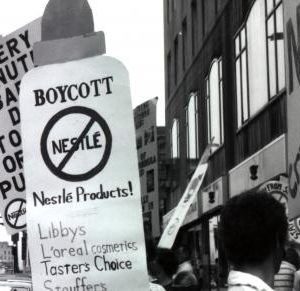Corporate Accountability (then Infact) launched the historic Nestlé Boycott in 1977. It was the first boycott to force a major corporation to heed the concerns of the global public and commit to major changes in its practices.
Nestlé, the world’s largest food corporation at the time, was aggressively marketing breast milk substitutes to mothers in the Global South as the most nutritious choice for their babies. Bent on selling infant formula to women who did not need — and indeed, were better off without — its products Nestlé, didn’t bother with the reality that these families wouldn’t be able to afford the formula in the long term. Nor did it acknowledge that it was pushing its product in situations where people had limited fuel and tools to sterilize bottles, refrigeration, and clean water to mix with the formula. All of this added up to hundreds of thousands infants dying — babies who would have survived had it not been for Nestlé and other corporations’ unethical marketing practices.
Working with allies around the world, Corporate Accountability organized a 10-nation boycott of Nestlé products and partnered closely with doctors and health professionals in the Global South. The campaign compelled the World Health Organization to advance a global code of marketing of breast-milk substitutes: a means of saving millions of infants’ lives. All of the member countries of the World Health Assembly voted to adopt the code…except the United States.
In 1984, boycotters achieved another major victory when Nestlé agreed to sweeping reforms in its infant formula marketing practices. An untold number of lives were saved as a result.




